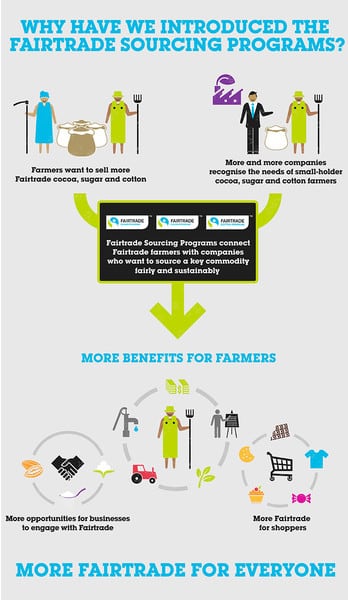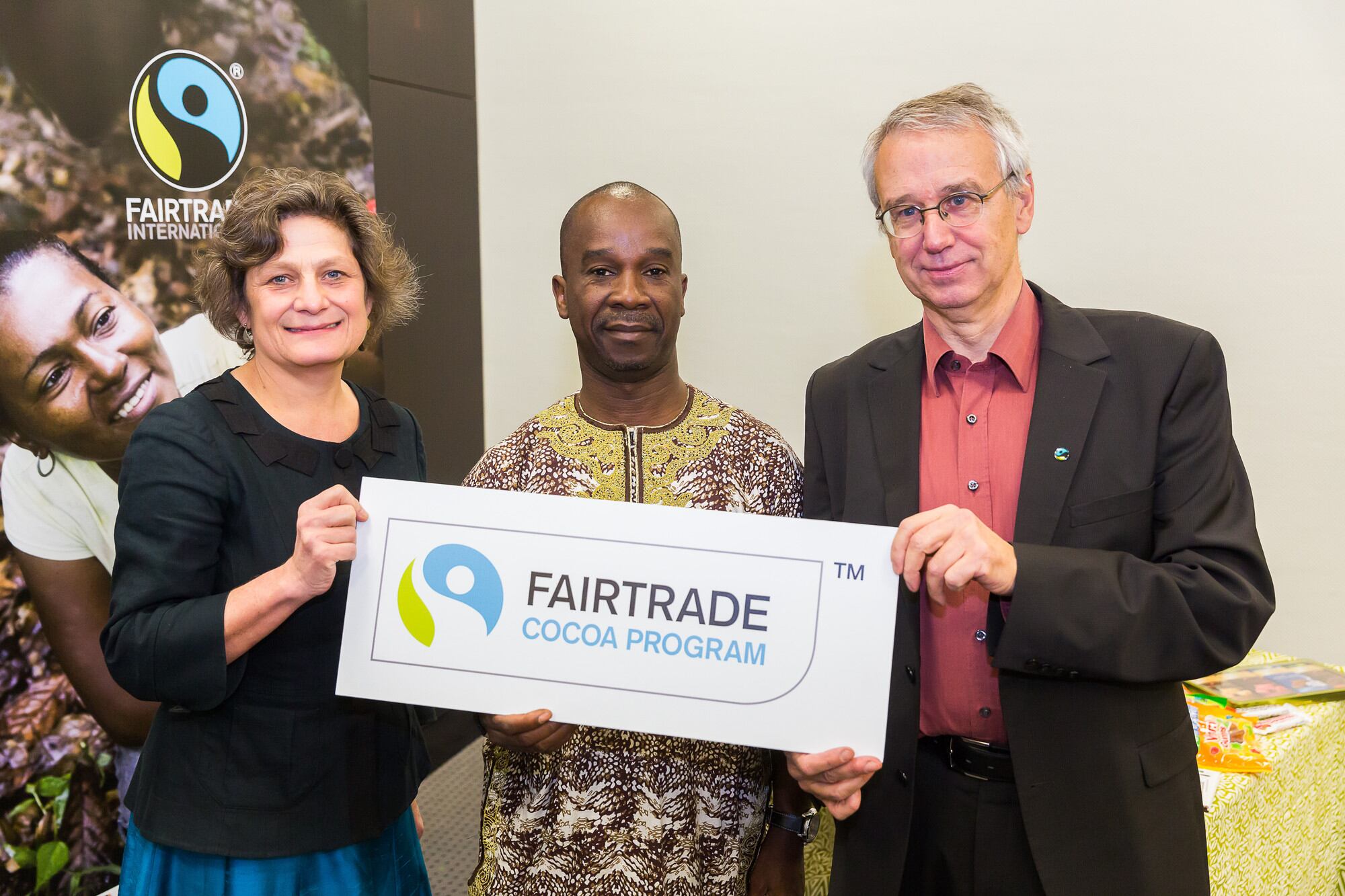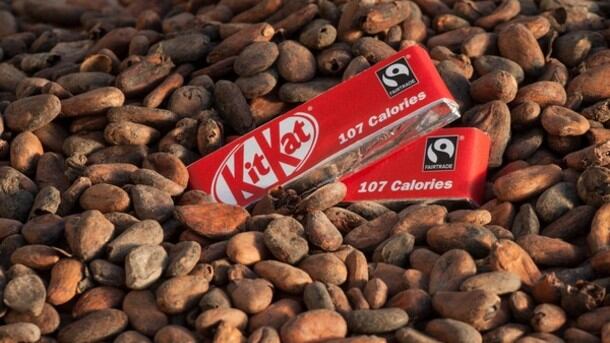The approach allows companies to bulk buy a single commodity as Fairtrade, whereas before companies had to source all ingredients for a brand on Fairtrade terms.
The model has already attracted nine companies including Mars, German chocolate maker Riegelein and the Rewe Group, providing a 14% boost for Fairtrade cocoa sales in 2014 compared to the prior year.
Mars has pledged to source all cocoa for Twix bars in Germany as Fairtrade, while Riegelein will source all cocoa for its own-label range on Fairtrade terms by 2017.
Getting more companies on board

Speaking to ConfectioneryNews after the program launch at the International Sweets and Biscuits Fair (ISM) in Cologne, Germany, Fairtrade International CEO Harriet Lamb said: “Cocoa is first out of the starting blocks with this new Fairtrade sourcing program.”
She said that many companies were previously reluctant to purchase Fairtrade as the old system had added too much cost at the market end instead of delivering more benefits to farmers.
“Our Fairtrade standards on the ground for the producers remain the same. But now we’re opening up a new opportunity where companies can look at sourcing all of their cocoa as opposed to focusing just on the sourcing for their chocolate bar,” she said.
What’s driving Fairtrade cocoa sales?
Nine Companies
New commitments from nine firms is set to deliver $1.2m in additional Fairtrade premiums to farmers by the end of this year and increases Fairtrade cocoa sales sixfold in Germany. The companies involved are: Mars, Rewe Group, Riegelein, Coop, AEON, Kambly, LIDL, Kaufland, and Switcher.
The Fairtrade head said that multiple factors had increased demand for Fairtrade cocoa sales, not only damning forecast for large cocoa shortages.
“We’ve seen a response from the industry both on cocoa farmers not wanting to grow cocoa in the future and in response to the clear public call for sustainability.”
Company commitments
She pointed to recent commitments from major companies including Mars, Ferrero and Mondelez to purchase cocoa from only sustainable sources by 2020.
Some companies have chosen to purchase more cocoa from third party certifiers, while others such as Nestlé have chosen to fulfil part of their commitment with their own sustainability programs.
“As a third-party certifier we believe very strongly that what you do as a third party is that you bring an independence that the public trust,” said Lamb.

“The public absolutely trust the sweet manufacturers to deliver great products; they just don’t know how they work with the farmers.”
Overdue commitments?
We asked Lamb why major commitments from companies had come now - shortly after forecasts of a 1m MT cocoa shortfall by 2020 – and not when the Harkin-Engel protocol to bring unlawful child labor to an end on cocoa farms was signed over a decade ago.
“You’d have to ask the companies. But I do think the agenda shifted – companies began to see the risk that farmers would not stay in cocoa and the public mood was also changing so strongly in favor of sustainability.”
“Ten years ago it was ‘we’ll leave this to the nice corporate social responsibility people and we do a little bit of giving to charity and a little bit of PR’.” She said that sustainability was now at the heart of companies’ strategies.
Minimum price: What’s the benefit for companies?
Fairtrade International, unlike UTZ Certified and Rainforest Alliance, guarantees farmers a minimum price of $2,000 per metric ton (MT) for Fairtrade cocoa, and a premium of $200 per MT.
Lamb said that many companies were at first concerned about how the minimum price would benefit them. “They fear it more than the reality.”
She said that before 2009, Cadbury was hesitant on Fairtrade, but the then CEO Todd Stitzer went to Ghana and met a cocoa farmer who explained that none of his sons wanted to follow in their Father’s footsteps and saw no future in cocoa.

“It was crystal clear that unless the companies make sure the farmers get a fair price, in the end, farmers will not grow cocoa any more – the next generation will not come through and the average age of a cocoa farmer in Ghana is 56,” said Lamb.
“Cadbury then said ‘no beans, no bars’. ‘ If we don’t pay the farmers a fair price they won’t grow cocoa and if they won’t grow cocoa we can’t make chocolate bars’.”
“The role we, Fairtrade, can play is enabling cocoa farmers to see a future in growing cocoa and staying on their land.”
Sourcing and core Fairtrade chocolate markets
The increased volumes for Fairtrade cocoa is mainly coming from the Ivory Coast and Ghana as well as Peru and the Dominican Republic.
“Up until now Fairtrade has been much weaker in Asia as a whole including in cocoa. That’s one of the areas we as a movement will need to invest because clearly some of the cocoa producing origins of the future are countries like Indonesia and we absolutely want to scale up our work with farmers there,” said Lamb.

The UK is the largest market for Fairtrade chocolate sales driven by Mondelez’s Cadbury Dairy Milk, Nestlé's Kit-Kat two and four fingers and Mars’ Maltesers.
“That’s had a level of breakthrough into the mainstream UK market that hasn’t been achieved in the rest of the world,” said Lamb. Fairtrade is experiencing fast growth in Germany and the heartland for Fairtrade is still largely Europe
“We very much see the markets of the south such as South Africa, India, Brazil, East Africa as the markets for the future of Fairtrade,” said Lamb.
